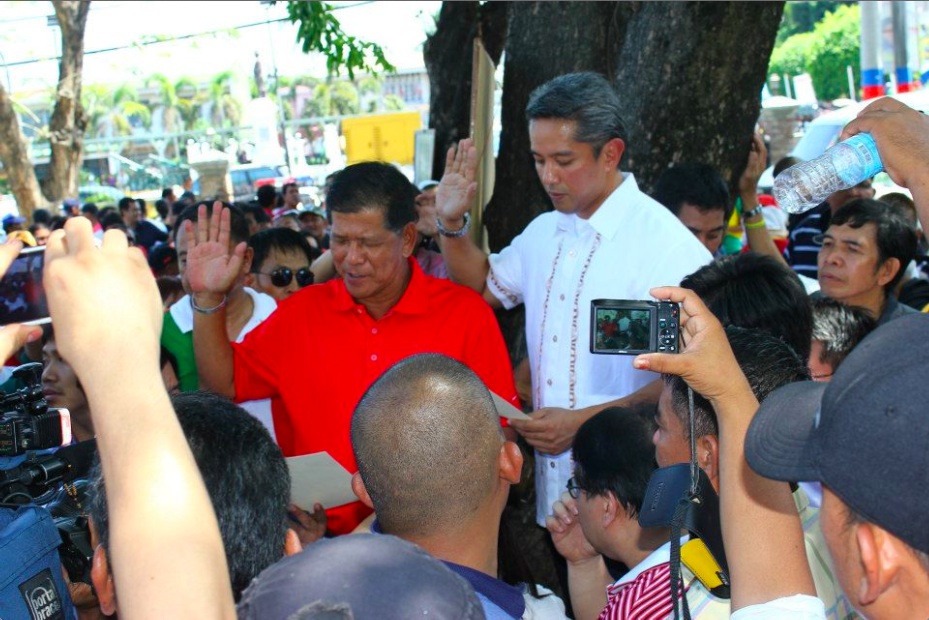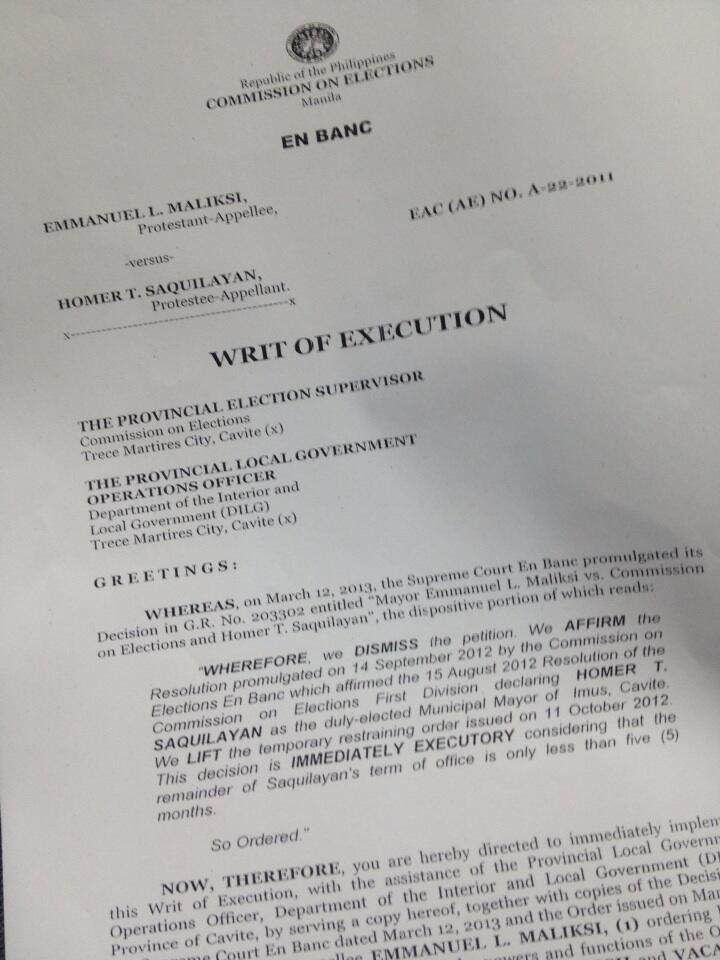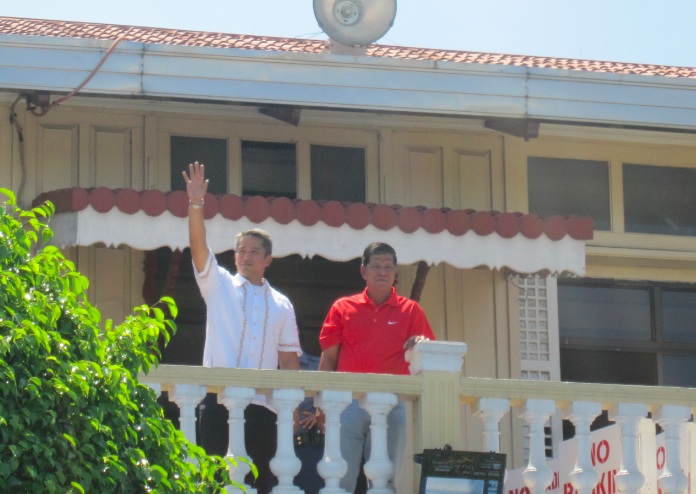SUMMARY
This is AI generated summarization, which may have errors. For context, always refer to the full article.

CAVITE, Philippines – A week since the Supreme Court issued an “immediately executory” order for him to step down as mayor of the city of Imus here, Emmanuel “Manny” Maliksi of the Liberal Party (LP) is still holding out.
On Monday, March 18, local officers of the Commission on Elections (Comelec), the Department of the Interior and Local Government, and the Philippine National Police came to city hall to serve Maliksi the Comelec’s writ of execution, and to install the rightful mayor, Homer Saquilayan.
Saquilayan took his oath before re-electionist Cavite Gov. Jonvic Remulla, an ally in the local Partido Magdalo. Remulla said on his Twitter account: “The Writ of Execution also came with an Entry of Judgment. And a directive for the Provincial Government of Cavite to implement it.”
Maliksi, son of Imus congressman and gubernatorial challenger Irineo Maliksi, is still holed up in the mayor’s office as of this posting. The Maliksis are allied with the Aquino administration.
Local sources said that while the Comelec was ready to carry out the order as early as 8:30 a.m., delays were encountered with the provincial police and DILG offices. Both offices are under Secretary Mar Roxas, an LP stalwart. Saquilayan’s reinstatement was carried out only at around 3 p.m.
Saquilayan and Maliksi are relatives.

First case to reach Supreme Court
Their case is the only electoral protest stemming from the first ever nationwide automated elections to reach the highest court.
At the most, it could provide a lesson on how, as Maliksi claimed, alleged cheating can be done, or made to appear to have happened, in computerized elections. At the very least – and setting aside reports of politics in the local court and Palace intervention for an ally – the case provides insights into how appreciation of evidence in automated polls can be improved.
Saquilayan won the mayoral race in 2010, leading Maliksi by more than 8,000 votes. According to the Municipal Board of Canvassers, Saquilayan got 48,181 votes, while Maliksi got 39,682.
In August 2012, however, a regional trial court judge in Imus declared that it was Maliksi who defeated Saquilayan by a little over 600 votes. The lower court sided with Maliksi, who claimed that some of the ballots were pre-shaded in favor of Saquilayan.
At the time of the 2010 polls, Maliksi was the incumbent mayor.
(The protest was filed before a local court because Imus was then still a municipality. It was converted into a city only in 2012. Electoral protests for the post of city mayor are filed before the Comelec.)
Saquilayan brought the case to the Comelec, where the first division, and later the commission en banc, upheld him as the winner. The poll body credited Saquilayan with 48,521 and Maliksi with 40,092.
However, newly installed Chief Justice Ma. Lourdes Sereno, using her sole authority, issued a temporary restraining order, preventing the Comelec from unseating Maliksi in October.
One of Saquilayan’s lawyers, Ferdinand Topacio, questioned why Sereno exercised her sole authority even outside “extraordinay circumstances.” The Court clarified, however, that the TRO was recommended by Justice Antonio Carpio before the court went on break. It was later upheld by the Court en banc.

Thrice won, thrice unseated, now reinstated
On Tuesday, March 12, the Supreme Court lifted the TRO and declared Saquilayan the winner of the 2010 mayoral elections. It was a close vote at 8-7. The Chief Justice voted with the majority.
A day later, however, a local election officer appeared on TV saying Maliksi should be allowed to file a motion for reconsideration, despite the SC order for that its decision to be “immediately executory.”
“The TRO is lifted. The decision is immediately executory considering that there are only less than 5 months left in Saquilayan’s term of office,” the SC said in a decision penned by Justice Carpio.
This is the third time that Saquilayan won the mayoral race but would later be unseated by candidates backed by then Gov. Irineo Maliksi. The first two times – in the 2001 and 2004 polls – Saquilayan defeated Oscar Jaro but was later unseated by the local court.
This is first time, however, that Saquilayan has been reinstated. Ironically, it’s Maliksi’s son who gets unseated in the process.
Saquilayan and Maliksi will be squaring off again for the mayoral post in May. – Rappler.com
Add a comment
How does this make you feel?
There are no comments yet. Add your comment to start the conversation.